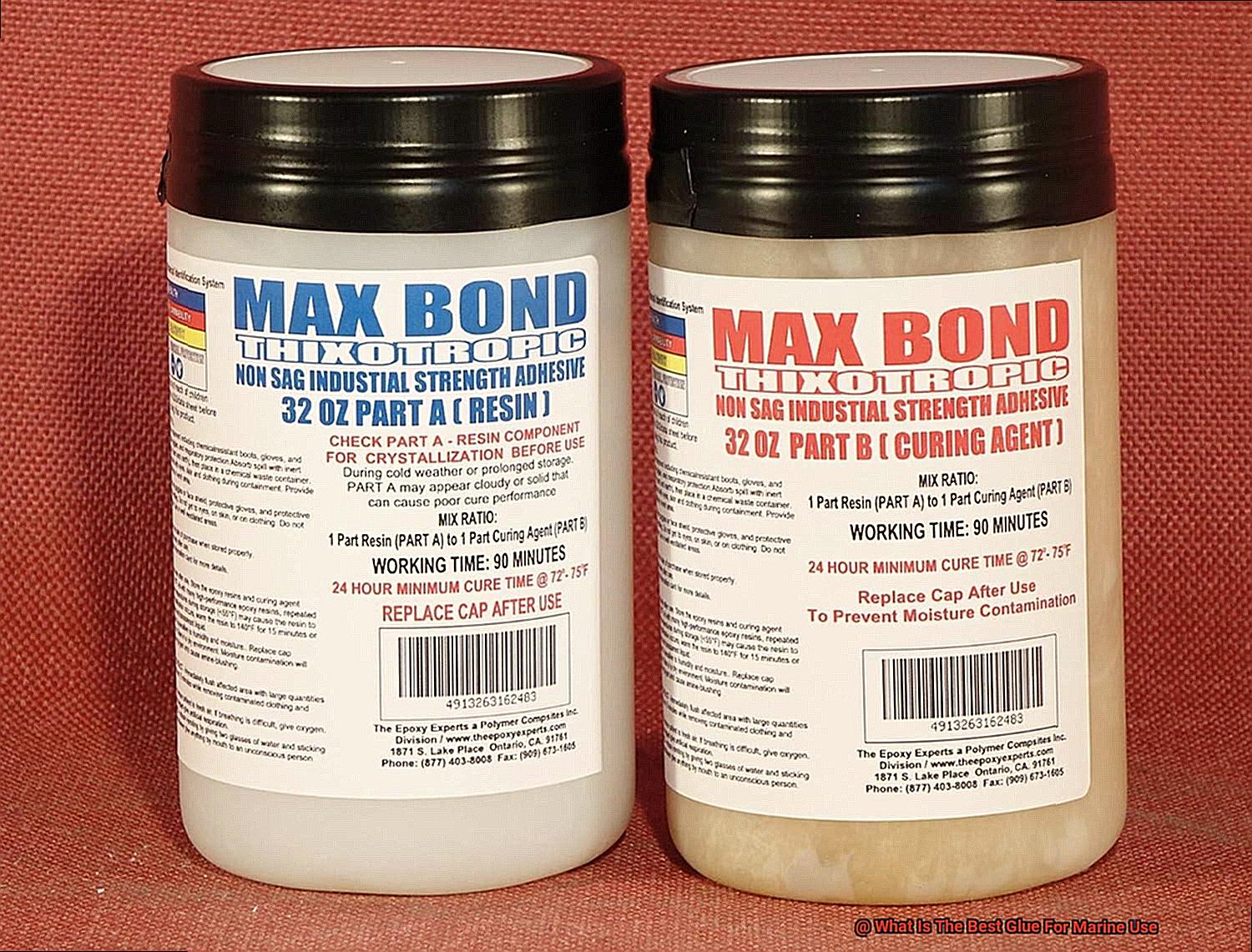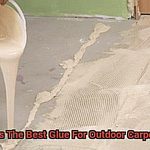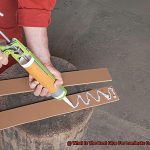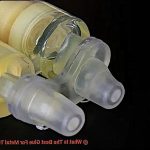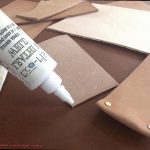Embarking on a journey across the boundless sea brings forth a cascade of anticipated and unforeseen challenges. From tempestuous waves to corrosive salt air, fluctuating temperatures to relentless vibrations, the marine environment demands unwavering durability and resilience from every component on board.
When it comes to repairs, maintenance, and construction, choosing the right adhesive can be the difference between a temporary fix and an enduring solution.
In the realm of marine adhesives, one reigns supreme in creating indomitable bonds: epoxy resin. Renowned for its exceptional adhesive properties, epoxy resin is the go-to glue for professionals and boat enthusiasts alike when it comes to all things marine. In this blog post, we will delve into what sets epoxy resin apart as the ultimate choice for marine applications. We’ll explore its unique advantages and emphasize why selecting the best glue is paramount for life on the water.
From patching cracks in fiberglass hulls to securing wooden planks, metal plates, and even plastic fixtures—the versatility of epoxy resin shines through like a lighthouse guiding ships through treacherous waters. Its ability to bond an extensive range of materials together is complemented by its formidable resistance to water. This ensures that even in the harshest maritime conditions, your bond remains steadfast and unyielding.
Whether you’re engaged in marine carpentry, repair work or constructing boat accessories—epoxy resin provides unrivaled adhesion that protects against moisture, corrosion, and UV radiation.
Unlike conventional adhesives, epoxy resin cures through an exothermic process that creates an inflexible and durable bond. Not only does it fill gaps with ease but it’s also impervious to marine solvents and fuel spills—making it suitable for both interior and exterior applications. With excellent mechanical strength, chemical resistance, and temperature stability, epoxy resin stands as the pinnacle of marine adhesive technology.
As your trusted companion in navigating the complexities of selecting the best glue for maritime endeavors, we’ll explore various aspects and considerations associated with epoxy resin.
Dive into our upcoming posts as we delve into specific applications, provide tips for proper application, and recommend the top epoxy resin products available today.
With our expert insights, you can set sail with confidence—secured by the power of the finest marine adhesive.
Factors to Consider When Choosing Glue for Marine Use
Contents
- 1 Factors to Consider When Choosing Glue for Marine Use
- 2 Adhesive Strength
- 3 Waterproofing Properties
- 4 Flexibility
- 5 Bonding Materials
- 6 Commonly Used Glues for Marine Applications
- 7 Epoxy Resin
- 8 Polyurethane Adhesive
- 9 Silicone Sealant and Cyanoacrylate Adhesive
- 10 Manufacturer’s Instructions and Recommendations
- 11 Research, Product Reviews, and Professional Advice
- 12 Conclusion
When it comes to selecting glue for marine use, there are several crucial factors to consider. Marine environments are notorious for their harsh conditions, including exposure to water, saltwater, UV radiation, high humidity, and extreme temperatures. Therefore, choosing the right glue is essential to ensure strong and durable bonds that can withstand these challenges.
- Waterproofness: Select glue specifically designed to be waterproof to prevent deterioration or loss of adhesive properties over time. It should resist water penetration effectively.
- Saltwater Resistance: Marine environments involve contact with corrosive saltwater. Choose a glue that is saltwater resistant to withstand these corrosive effects without weakening.
- UV Resistance: Prolonged exposure to sunlight in marine environments can cause UV damage and deterioration. Look for glues that maintain their integrity and adhesive properties even after long-term exposure to sunlight.
- Flexibility: Marine applications often involve materials that undergo constant movement, such as vibrations from waves or bending and flexing. Choose a flexible glue that can bond and hold materials together under dynamic conditions.
- Chemical Resistance: Marine environments can be exposed to various chemicals like fuel, oils, cleaning agents, and solvents. Select a glue that can withstand exposure to these substances without being affected or weakened.
- Application Method: Consider the ease of application when selecting glue for marine use. Some glues may require specific equipment or techniques, while others are more user-friendly and easy to apply.
- Longevity: Marine applications require glues with long-lasting bonds that can withstand harsh conditions. Look for glues known for maintaining their adhesive properties over time.
- Compatibility with Materials: Different marine applications may involve bonding different types of materials, such as wood, metal, fiberglass, or plastic. Choose a glue that is compatible with the specific materials being bonded.
Adhesive Strength
Adhesive strength is a critical factor to consider when choosing the best glue for marine applications. This term refers to the glue’s ability to bond and hold materials together under the harsh and demanding conditions encountered in marine environments. Imagine being out on the open sea, with waves crashing against your vessel and the relentless sun beating down on you. In this unforgiving setting, ordinary glues simply won’t suffice. That’s where adhesive strength comes into play.
Let’s dive deeper into some of the powerhouses in the world of glue that possess exceptional adhesive strength for marine use. First up, we have epoxy adhesives. These champions consist of two components – resin and hardener – that undergo a chemical reaction, resulting in an incredibly strong bond. Epoxy adhesives are renowned for their remarkable durability and resistance to water, chemicals, and temperature fluctuations. They excel at bonding various materials like metal, wood, and fiberglass, which are commonly found in marine applications.
Next on our list are polyurethane adhesives, known for their flexibility and ease of bonding diverse materials. These glues create a robust bond that remains flexible even in extreme temperatures. Moreover, they offer resistance to water, saltwater, and the myriad of chemicals you might encounter while sailing the seven seas.
Last but certainly not least, we have cyanoacrylate glues, commonly referred to as super glues. While they may not be suitable for all marine applications due to their moisture sensitivity, they can provide exceptional adhesive strength for specific projects. These glues bond rapidly and firmly to materials such as metal, plastic, and rubber.
However, before setting sail with your chosen glue, take a moment to consider other factors as well. Curing time is crucial because you don’t want to spend hours waiting for the glue to set while your project hangs in limbo. Flexibility is also paramount when dealing with the constant movement of a boat. Additionally, ensure that the glue is compatible with the materials you’re working with to avoid any unwelcome surprises.
Waterproofing Properties
Waterproofing properties are a crucial consideration when choosing the right glue for marine use. In the marine world, where water, humidity, and moisture are constant challenges, it is essential to select a glue that can withstand these conditions without compromising its adhesive strength.
There are several types of glues available with varying levels of waterproofing properties. Epoxy glue is a popular choice for marine applications due to its exceptional water resistance and durability. It forms an unbreakable bond that can withstand exposure to saltwater, freshwater, and extreme weather conditions.
Polyurethane glues are another excellent option with strong waterproofing properties. These glues create a bond that remains unaffected by water, making them ideal for marine repairs and projects. Additionally, polyurethane glues also resist UV rays, preventing degradation and discoloration over time.
Silicone adhesive is frequently used in marine applications as well. This flexible adhesive offers excellent water resistance, making it perfect for sealing gaps, joints, and seams in marine vessels. It can handle prolonged submersion in water and effectively keeps leaks and moisture at bay.
However, it is important to note that not all glues claiming to be waterproof are suitable for continuous underwater use. Some may only resist splashes or short-term exposure to water. Therefore, it is crucial to carefully review product specifications and choose a glue specifically designed for marine use.
Proper surface preparation is also essential in achieving strong and lasting bonds in a marine environment. Before applying any adhesive, surfaces should be thoroughly cleaned and dried. Dirt, oil, or moisture on the surfaces can hinder the effectiveness of the glue and compromise its waterproofing properties.
It is also advisable to follow the manufacturer’s instructions regarding application techniques and curing times. Each type of glue may have specific requirements for optimal performance and waterproofing capabilities. Adhering to these guidelines ensures that the glue bonds effectively and maintains its integrity even in harsh marine conditions.
Flexibility
When it comes to choosing glue for marine use, flexibility is a crucial factor that cannot be overlooked. The marine environment poses unique challenges, including constant exposure to moisture, fluctuating temperatures, and powerful forces such as waves and winds. In order to ensure the longevity and integrity of bonded materials in this harsh setting, it is essential to select a glue that offers exceptional flexibility. In this blog post, we will explore why flexibility is important when choosing glue for marine applications and discuss some of the top options available.
The Role of Flexibility:
Flexibility is vital in the marine environment due to the continuous movement experienced by watercraft. As boats and ships navigate through rough waters, they undergo various stresses and strains, causing materials to expand and contract. A flexible bond allows for this movement without compromising the adhesive strength of the glue. It ensures that materials stay securely bonded even under extreme conditions, preventing leaks, cracks, and other structural failures.
Top Glue Options with Flexibility:
- Polyurethane Adhesive: Polyurethane adhesive is an excellent choice for marine applications due to its exceptional flexibility. It can withstand extreme temperatures and resist water, making it ideal for long-term use in the marine environment. Polyurethane adhesive also has the ability to expand and contract with the materials it bonds, ensuring a strong and durable bond that can withstand the constant movement experienced on watercraft.
- Epoxy Adhesive: Epoxy adhesive is another popular option known for its high strength and durability. While it may not offer as much flexibility as polyurethane adhesive, epoxy still provides a certain level of flexibility while maintaining its robust bonding properties. It offers excellent resistance to water, chemicals, and UV radiation, making it suitable for various marine applications.
- Silicone Adhesive: Silicone adhesive is a flexible champion that excels at sealing gaps and joints in marine vessels. It offers exceptional water resistance and remains flexible even under continuous exposure to moisture. Silicone adhesive is particularly useful for sealing areas where movement is expected, such as around windows, hatches, and fittings.
Proper Surface Preparation:
To achieve a flexible bond in marine applications, proper surface preparation is crucial. Surfaces should be thoroughly cleaned, dried, and free from any contaminants that may interfere with the bonding process. Additionally, roughening the surfaces with sandpaper or using a primer can enhance adhesion and increase the flexibility of the bond.
Bonding Materials
The marine industry demands unwavering strength and durability in its connections. To achieve this, selecting the right bonding material is paramount. In this blog post, we will delve into the world of adhesives commonly used in the marine industry. We will explore the types of bonding materials available and highlight the essential factors to consider when choosing the best glue for marine applications.
Types of Bonding Materials:
Epoxy Adhesives:
- Renowned for their exceptional strength and resistance to water, chemicals, and temperature fluctuations.
- Ideal for bonding fiberglass, metal, wood, and other boat construction and repair materials.
- Examples: WEST SYSTEM Epoxy, 3M Marine Adhesive/Sealant 5200.
Polyurethane Adhesives:
- Offer a unique blend of strength and flexibility, making them perfect for materials that experience frequent movement or expansion/contraction.
- Often used for sealing joints and securing deck hardware.
- Examples: Sikaflex 291 LOT, 3M 5200 Marine Adhesive Sealant.
Silicone Adhesives:
- Provide remarkable water resistance and flexibility.
- Commonly used for sealing gaps or bonding materials that require flexibility.
- Examples: Dow Corning Marine Silicone Sealant, 3M Marine Grade Silicone Sealant.
Factors to Consider when Selecting Bonding Materials:
Material Compatibility:
- Ensure compatibility between the adhesive and the materials being bonded (e.g., fiberglass, metal, wood) to achieve a robust connection.
Application Requirements:
- Take into account specific application needs such as load-bearing capacity, flexibility, or gap-filling ability.
Environmental Conditions:
- Choose adhesives specifically designed for marine use, tested to withstand saltwater, UV exposure, and extreme temperatures.
Surface Preparation:
- Thoroughly clean, dry, and prepare the surfaces before applying the adhesive to maximize bonding strength.
Commonly Used Glues for Marine Applications
If you’re on a quest to find the perfect glue for your marine applications, fear not, for we are here to help you navigate through the options. In this guide, we will explore the different types of glues commonly used for marine applications, from the mighty epoxy resin to the versatile polyurethane adhesive and the trusty silicone sealant. So hoist your anchor and let’s set sail on this adhesive adventure.
Epoxy Resin: The Unsinkable Bond
Epoxy resin is like a sturdy lifeboat for your marine projects. Whether you’re working with fiberglass, wood, metal, or plastic, epoxy will form a strong and durable bond that can withstand water, salt, and other unforgiving conditions.
Polyurethane Adhesive: Smooth Sailing with Flexibility
When it comes to handling movement and vibration, polyurethane adhesive is your go-to option. It offers excellent resistance to water and extreme temperatures while providing flexibility. It’s ideal for sealing joints, bonding hulls, and repairing boat decks.
Silicone Sealant: Keeping Water at Bay
Silicone sealants are the ultimate warriors against water intrusion. With their excellent water resistance and flexibility, they create watertight seals that can withstand UV radiation and temperature fluctuations. Seal windows, hatches, and other openings on your boat with confidence using silicone sealant.
Marine-Grade Adhesive Sealants: Built for the High Seas
Marine-grade adhesive sealants are highly durable, resistant to water, salt, and chemicals. They can bond a variety of materials such as fiberglass, aluminum, wood, and plastic. Use them to seal leaks, bond deck fittings, and repair boat hulls.
Super Glue (Cyanoacrylate Adhesive): The Quick Fix
Super glue may not be the captain of marine adhesives, but it has its place on board. Its fast-setting properties make it perfect for small repairs or bonding non-porous materials like glass or metal.
Epoxy Resin
In the world of marine applications, where structures face constant contact with water and harsh conditions, finding the right adhesive is crucial. Enter epoxy resin, a two-part adhesive that reigns supreme in the marine world. Offering unparalleled strength, durability, and resistance to water and chemicals, epoxy resin has become the go-to choice for boat repairs, construction, and maintenance. In this article, we will explore the fascinating properties of epoxy resin and understand why it is considered the unbreakable bond that keeps marine structures intact.
Versatility:
Epoxy resin is a true chameleon when it comes to bonding materials. It effortlessly adheres to fiberglass, wood, metal, and even concrete – the common inhabitants of marine environments. This versatility allows it to secure structural components, seal joints, and repair hulls with ease.
Water Resistance:
The ultimate advantage of epoxy resin lies in its exceptional resistance to water. It creates an impenetrable barrier that shields surfaces from moisture infiltration, safeguarding against rot, corrosion, and degradation. No matter how relentless the waves may be, epoxy resin stands firm.
Corrosion Protection:
Marine environments are notorious for their corrosive nature, especially when saltwater is involved. Thankfully, epoxy resin is highly resistant to the destructive forces of saltwater. With this adhesive at your side, you can rest assured that your structures will remain unyielding in the face of corrosion.
Strength and Durability:
Once cured, epoxy resin forms an unbreakable bond that withstands heavy loads, vibrations, and impacts. It becomes the guardian of structural components such as hulls, decks, bulkheads, and joints – fortifying them against the relentless forces of nature.
Gap-Filling Capabilities:
Epoxy resin possesses a secret power – its low viscosity. This allows it to penetrate porous surfaces, artfully filling gaps and voids. Whether dealing with irregular or uneven surfaces, epoxy resin ensures a flawless seal or bond.
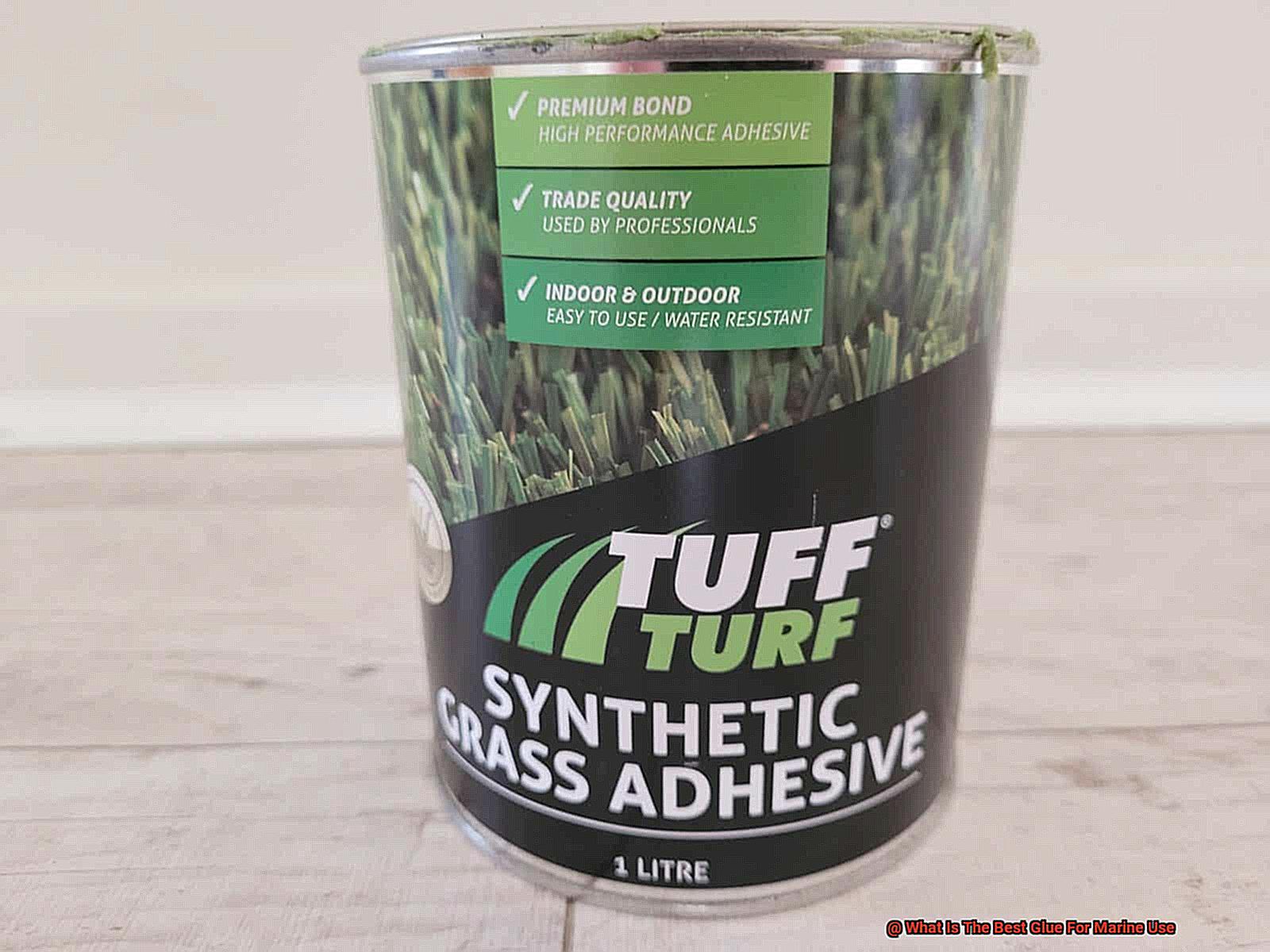
UV Resistance:
Exposure to sunlight can be a silent killer for adhesives, causing yellowing and degradation over time. But not for epoxy resin. It boasts remarkable resistance to UV radiation, preserving its strength and integrity even under the harshest sunlit conditions.
Polyurethane Adhesive
If you seek an adhesive that can brave the tempest and keep your marine structures steadfast, look no further than polyurethane adhesive. This versatile glue is a superhero for your boat repairs, construction, and maintenance needs. Let us plunge into the advantages that make polyurethane adhesive an invaluable companion in the treacherous world of the sea.
Unyielding Resistance to Water and Moisture:
- Polyurethane adhesive flaunts unparalleled resistance to water and moisture, making it the go-to choice for marine applications.
- Unlike other glues, polyurethane adhesive maintains its unwavering strength and integrity even when submerged in water for extended periods.
- Bid adieu to concerns about your bond weakening due to constant exposure to water.
Temperature Fluctuations? No Sweat.
- Marine environments endure extreme temperatures, but polyurethane adhesive can handle scorching heat and bone-chilling cold without sacrificing its bond strength.
- Your marine structures will remain secure and durable, regardless of how wildly the temperature fluctuates.
Flexibility to Embrace Movement:
- Waves, vibrations, and temperature changes can cause materials to expand or contract in marine applications.
- Polyurethane adhesive’s exceptional flexibility and elasticity allow it to gracefully absorb these movements without a crack or break, ensuring an enduring bond.
- Revel in confidence knowing that your structures can withstand the ever-changing challenges of the sea.
Chemical Resistance for Peace of Mind:
- Saltwater, oils, fuels, and cleaning agents are commonplace in marine settings. Thankfully, polyurethane adhesive possesses commendable chemical resistance against these elements.
- Rest assured that your bond will remain unscathed and unaffected by exposure to these chemicals.
One or Two? Choose Your Curing Option:
- Polyurethane adhesive is available in one-component and two-component forms.
- The one-component adhesive is ready to use, while the two-component adhesive requires a thorough mixing before application.
- Both options offer reliable bonding, but the two-component adhesive ensures a faster curing time and potentially a stronger bond.
Silicone Sealant and Cyanoacrylate Adhesive
When it comes to marine applications, selecting the appropriate adhesive is crucial for ensuring the longevity and resilience of your boat or yacht. Silicone sealant and cyanoacrylate adhesive are two popular options, each offering distinct advantages and disadvantages. In this blog post, we will compare and contrast these adhesives to help you make an informed decision for your marine projects.
Silicone Sealant:
Advantages:
- Excellent waterproofing properties: Silicone sealant forms a durable, watertight seal, making it ideal for sealing gaps, joints, windows, hatches, and fittings in boats and yachts.
- Versatility: It adheres well to a wide range of materials commonly found in marine applications, including fiberglass, metal, glass, plastic, and wood.
- Resistance to moisture and UV rays: Silicone sealant is resistant to moisture, UV rays, and temperature fluctuations, making it suitable for the harsh marine environment.
- Flexibility: It remains pliable even after curing, allowing it to withstand vibrations and movements without cracking or losing its sealing properties.
Disadvantages:
- Longer curing time: Silicone sealant typically takes longer to cure compared to cyanoacrylate adhesive.
- Limited material compatibility: While silicone sealant bonds well with most materials, it may not adhere as effectively to rubber or flexible plastics.
Cyanoacrylate Adhesive:
Advantages:
- Quick bonding time: Cyanoacrylate adhesive forms an extremely strong bond within seconds of application, allowing for immediate use or further assembly.
- Water resistance: It exhibits excellent resistance to water and moisture, ensuring the durability of the bond in marine environments.
- Ideal for small repairs: It is perfect for bonding small parts or repairing minor damages in marine equipment and accessories.
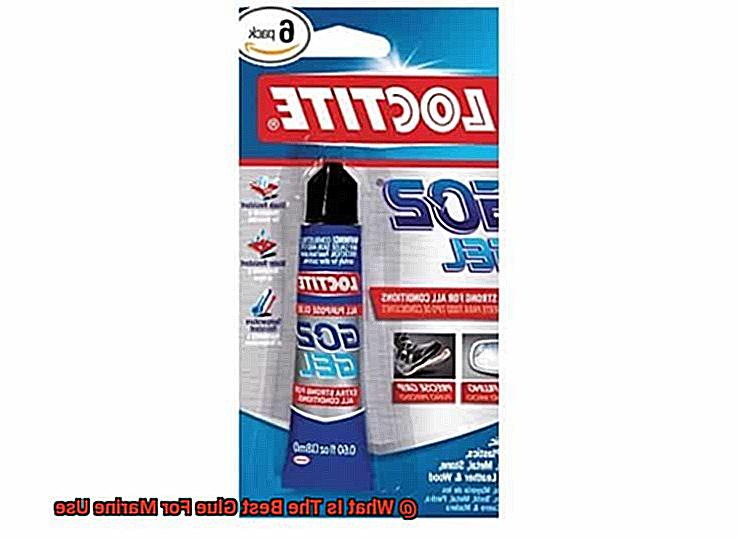
Disadvantages:
- Lack of flexibility: Cyanoacrylate adhesive is not as pliable as silicone sealant, which means it may not withstand constant movement or vibrations.
- Limited material compatibility: It may not adhere well to certain materials such as rubber or flexible plastics.
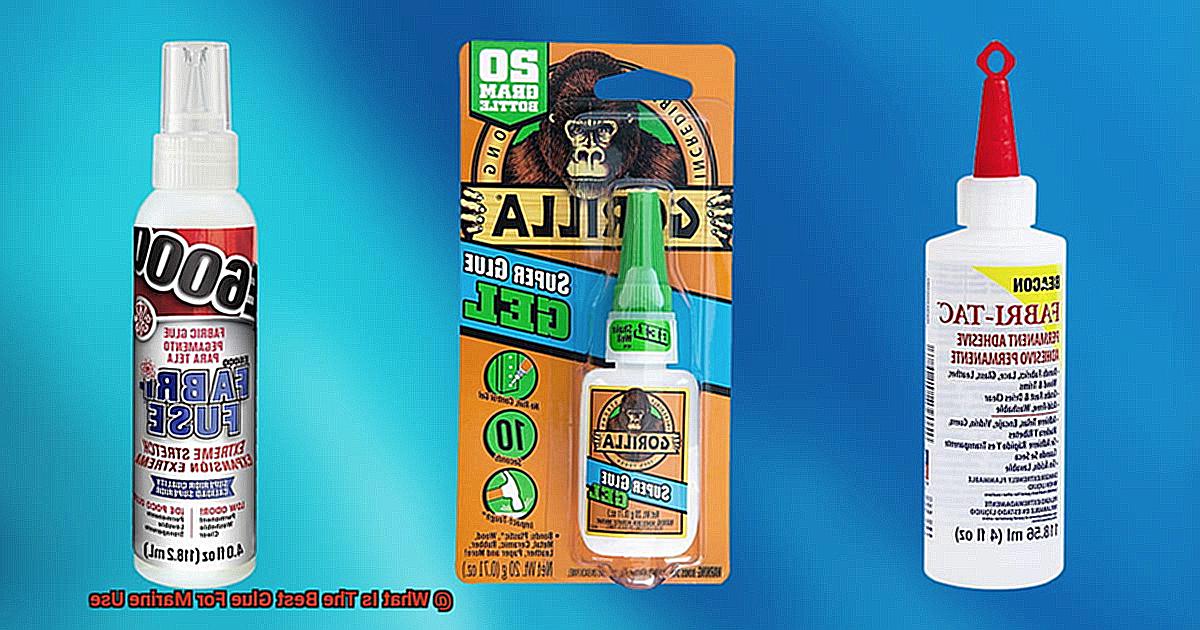
Manufacturer’s Instructions and Recommendations
When it comes to glue for marine use, the manufacturer’s instructions and recommendations are like the guiding stars in a vast ocean. They provide essential knowledge and expert advice on how to choose the right glue and achieve the best results for your marine projects.
First and foremost, adhesion strength is key when selecting a glue for marine applications. You need a glue that can withstand the relentless assault of water, salt, and other harsh elements. Silicone sealants are a popular choice due to their excellent adhesion strength and flexibility. They create watertight seals on various surfaces, making them perfect for sealing joints, seams, and gaps in boats and watercraft.
But what about waterproofing capabilities? Marine environments are notoriously wet, so you need a glue that can endure constant exposure to water without losing its adhesive properties. Enter polyurethane adhesives. These versatile glues bond well to a wide range of materials and offer exceptional resistance to water. They are ideal for fixing leaks or securing deck fittings.
In addition to adhesion strength and waterproofing capabilities, environmental resistance is crucial. Marine environments can be brutal with their UV rays, extreme temperatures, and chemical exposure. That’s where epoxy adhesives shine. They provide strong bonds and can handle the demanding conditions of marine settings with ease.
Now that we’ve explored some examples of glues suitable for marine use, let’s circle back to the importance of heeding the manufacturer’s instructions and recommendations. These instructions offer valuable insights on achieving the best results with a particular glue. They may include surface preparation tips like cleaning and drying surfaces before applying the adhesive. Following these instructions ensures effective bonding and longer-lasting results, saving you time and money in the long run.
Manufacturer’s recommendations also cover factors like temperature ranges, humidity levels, and curing times. By following these guidelines, you can ensure optimal performance and durability in the face of harsh marine conditions. Moreover, manufacturers often provide storage and shelf life instructions to maintain the adhesive properties of the glue over time.
Research, Product Reviews, and Professional Advice
If you’re embarking on a marine project and need the perfect glue to keep things shipshape, look no further. In this comprehensive guide, we’ll navigate the waters of research, product reviews, and professional advice to help you find the best glue options for your marine adventures.
Understanding the Marine Environment:
Before we set sail, let’s delve into the treacherous challenges that marine environments pose for adhesives. With water, salt, extreme temperatures, and UV rays ready to wreak havoc, finding a glue that can withstand these elements is crucial. Trust us; you don’t want your hard work sinking.
Seeking Professional Advice:
To chart a course to the right glue, we’ll consult industry experts who have weathered the storms of marine construction, boatbuilding, and repair. These seasoned mariners possess a wealth of knowledge that will guide us in selecting the perfect adhesive for your projects. From calm seas to raging tempests, they know which glues can stand strong.
Riding the Wave of Product Reviews:
Diving into the sea of product reviews and testimonials, we’ll ride the waves to find objective assessments of various glues available for marine use. We’ll evaluate factors like bonding strength that can hold your projects together even in turbulent waters. Water resistance will ensure your adhesives won’t dissolve under pressure. UV protection will shield them from the scorching sun. Ease of application will make your journey smoother. And durability will guarantee they endure every voyage.
Exploring Types of Marine Adhesives:
Not all glues are created equal when it comes to marine projects. We’ll embark on an exploration of different types of adhesives commonly used in the industry – epoxy adhesives, polyurethane adhesives, silicone sealants, and more. Each possesses its own unique properties and applications, like the sturdy anchor for your boat or the solid foundation for your dock. No matter the task at hand, we’ve got you covered.
G-aQzoHqM80″ >
Conclusion
When it comes to marine applications, finding the best glue is crucial. After careful research and consideration, one glue stands out above the rest – epoxy resin. Its exceptional strength and durability make it perfect for bonding materials in marine environments.
Epoxy resin forms an incredibly strong bond that can withstand the harsh conditions of saltwater, extreme temperatures, and constant exposure to moisture. It adheres to a wide range of surfaces, including wood, fiberglass, metal, and plastic.
What sets epoxy resin apart is its ability to resist water penetration. Unlike other adhesives that may weaken or break down when exposed to water, epoxy remains steadfast. This makes it ideal for sealing leaks in boat hulls or repairing damaged parts.
Moreover, epoxy resin offers excellent chemical resistance. It can withstand exposure to fuel, oil, solvents, and cleaning agents commonly found in marine environments without losing its adhesive properties.
Not only does epoxy provide exceptional strength and resistance, but it also offers versatility in its application. It can be used for various marine projects such as installing hardware fittings, bonding deck surfaces, repairing cracks or holes in hulls, or even constructing small boats.
In conclusion, when it comes to choosing the best glue for marine use, epoxy resin is the clear winner. Its unmatched strength, durability, water resistance, chemical resistance, and versatility make it the go-to adhesive for any maritime project.

